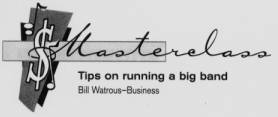Back To Articles Archive About The Author Jazz Vocal Techniques


Windplayer - Volume #62
By Anne Farnsworth
Keeping a big band organized and working requires a real grab bag of skills. At any given time, you have to be a promoter, phone jockey, music librarian, psychiatrist, and baby -sitter. It's a true labor of love because, unless you're running a legacy band with the names Basie, Dorsey, or Ellington attached, you're not going to get rich. The days of making a living with a big band are over, and the heyday of the clubs that supported these bands are long gone.
But even with a lack of obvious available venues, an enterprising leader can find places to play.
A lot of people are out there who want to hear this music. There are some territory bands still functioning, thanks to leaders who fight tooth and nail to keep a group working. One example is Ray Eubanks in Columbus, Ohio, who has kept a band together for years and has reached a point where he's received grants to support the band's performances.
Today, most bands play locally; club dates and colleges, mostly. If you want to expand into the festival circuit, you'll have to make a CD, get reviewed, and get some airplay.
The first thing you need is a library of arrangements. The charts I use are mostly original tunes collected over the years; written by guys like Ken Kaplan and Gordon Goodwin. My group is not a repertory band. The classic standards are great learning tools for young players but if I'm going to hear Ellington tunes I want to hear them played by Ellington's players - you can't improve on those performances.
You'll spend a lot of time on the phone booking your band, but you'll spend even more time scuffling for players and keeping the personnel organized. I only play with the guys I want to play with - it's not worth the time and energy throwing pick-up bands together for a gig. Big band charts are tricky, and I need to have guys on the stands who are familiar with the arrangements. Here in Los Angeles, the best players work with everybody and it's hard to keep a regular roster on every gig. Even at festivals, you'll sometimes find the same group playing in several of the bands. There's a good reason for this: these people are "first call" because they're the best. And if you want to play with the best, you'll have to deal with the problem of substitutes.
Substitutions are a fact of life in a large unit. Sometimes you get lucky, and the sub is a great sight-reader. But for me, the almost instinctive choreography of a group of your own guys is never going to be there with pick-up players. Of course it's easier to put substitutes into a section surrounded by regulars who can point out jumps or quirks in the arrangement. But if everyone is new to the material, or if just your lead trumpet player can't make the gig, it can be a disaster.
When I rehearse a band, I try to get a whole picture of the chart in my head and convey that picture to the band. I start out by defining and assigning the solo sections. Once that's done, I move on to cleaning up the ensemble sections, intros, and codas. I want my big band to feel like a small group. I don't want it to feel heavy or ponderous, but to have that flexibility and spontaneity you'd find in a quartet, for example.
I consider the chart and the band as a vehicle for soloists. A lot of leaders use tight arrangements that leave little space for soloing, or they use one guy for all the solos. This makes it hard for the rest to stay interested, so I like to have a lot of open sections for improvising and I spread the solos around to most of the musicians. It keeps the performance exciting for both the audience and the players. My guys practice when they have a rehearsal scheduled with me because they they're going to get a chance to stretch out.
Fronting a big band as a player can be a daunting task. I've found that the vast amounts of energy and concentration it takes to organize, book, and lead a large group takes away from my own practice time. But I'm willing to do it because it's a great medium for me to express myself as a musician.
Why go to all the trouble seeing to the care and feeding of a large musical group? Simple - leading a big band is the greatest feeling in the world and playing in front of one is even better. You get a tremendous uplift. There's nothing that compares to the thrill of being at the helm of a great musical machine hitting on all cylinders at once, taking off and bringing the audience with it.
All Rights Reserved
Do Not Reprint Without Permission